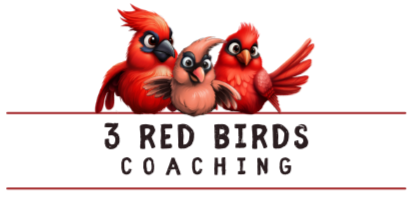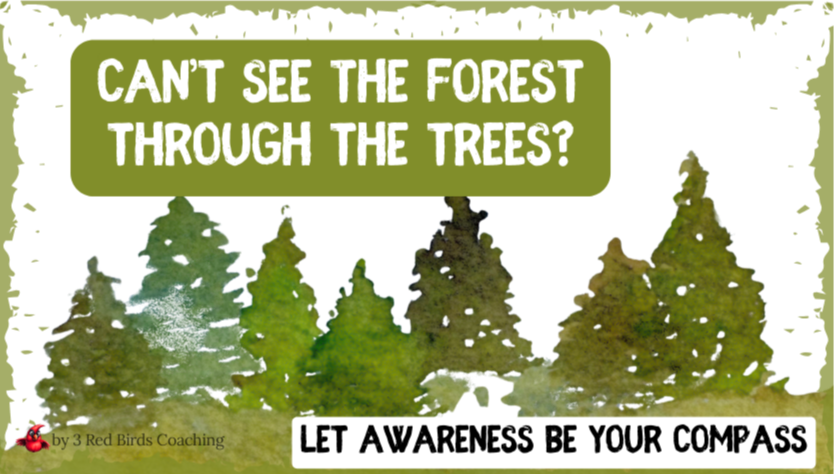Can’t See the Forest Through the Trees? Let Awareness Be Your Compass
There’s a certain tunnel vision that takes over when you’re juggling family, work, friendships, parenting, and if you’re lucky, maybe some sleep. With this type of laser focus on all that needs to get done, it’s easy to lose sight of the bigger picture.
Suddenly, it’s as though all you can see are the demands in front of you — the dust bunnies gathering in corners, the never-ending piles of laundry, uncooked dinners, baseball practices, school bake sales — while the fridge stares back at you, empty.
And just like that, these daily stressors turn into weapons we use against ourselves. We begin to say, and more importantly start believing the story, “You’re not doing enough.” You fall into bed thinking about what you didn’t finish, and wake up to those same thoughts on repeat.
This is a modern-day example of “not seeing the forest through the trees”. For many of us, it's the cost of trying to do it all, chasing the illusion of the Superwoman badge, and falsely believing that earning it will make us worthy.
But here’s the thing: there’s actual science behind why we get stuck in the “trees.” And more importantly, there are real ways to zoom out, see the full picture, and begin to lighten the load.
What Does “Can’t See the Forest Through the Trees” Even Mean?
It’s a classic metaphor for when you’re so focused on the small details (the trees) that you miss the larger context (the forest). In life, it looks like:
Obsessing over daily tasks without ever asking if they actually matter
Fixating on other people’s needs while ignoring your own burnout
Living on autopilot, but not really living
So, what’s the solution? Self-awareness — the ability to observe your own thoughts, emotions, behaviors, and motivations without instantly reacting to them.
The Brain Science of Self-Awareness
Time for a little bit of science to prove it’s not you, it’s just how we’re wired.
When life feels overwhelming, it’s easy to become stuck staring at the “trees” (dust bunny, pile of laundry, dirty dish) just trying to get through the day. When this happens, we can lose sight of the bigger picture because your brain is in survival mode, reacting to whatever’s right in front of you.
Here’s what’s happening in simple terms:
Thoughts create emotions
“I’m behind on everything” → stress, frustrationEmotions drive actions
Stress, frustration → You might overwork, shut down, or snap at someone.Actions lead to results
These reactions → shape your day, your relationships, and how you feel about yourself.
The problem? This cycle keeps repeating until you pause, become aware of it, and make a identify one small shift you can make that will bring you closer to where you want to be.
That’s where self-awareness comes in. It’s like stepping back to see the whole forest again. It helps you:
Notice your thoughts
Understand your emotions
Choose how to respond rather than just react
Your brain is built for this, and the more you practice, the easier it becomes to step out of the chaos and reconnect with what really matters.
What You Might Be Carrying Without Even Realizing It
Chronic stress, distraction, and emotional overload? These all mess with our ability to move from reacting to responding to all that’s going on around us. Self-awareness helps unpack our invisible, unspoken baggage that comes in the shape of:
Unprocessed emotions
Limiting beliefs from childhood (hello, perfectionism)
Social comparison and unrealistic expectations
Most of us don’t even realize we’re carrying this stuff until it breaks us down.
How to Zoom Out so You Can See the Forest
So how do you get out of the weeds and zoom out?
1. Pause and Prioritize
When the to-do list feels endless, it's easy to believe you have to do it all right now. But that story only adds to the stress. Instead, pause and ask yourself, “What truly needs my attention today, and what can wait?”
Not everything is urgent. By pausing and slowing down, you give yourself space to see it won’t be the end of the world if there are dirty dishes in your sink. You get to redirect your energy to where it counts most.
2. Self-Assessments — Do Regular Emotional Check-Ins
Once you’ve paused to prioritize, the next step is to check in with you.
Take a moment to ask yourself:
What am I feeling right now?
How strong is this feeling?
Where is this feeling coming from?
Think of it like taking your emotional temperature. Is it a simmering frustration? A deep sadness? Lingering anxiety? Naming and accepting what you're feeling gives your brain a sense of clarity and calmness, allowing you to then respond instead of react to the feeling you’re having.
These emotional check-ins don’t need to be long or complicated. Just a few honest moments with yourself can shift your entire day. The more often you do it, the more connected you'll feel to what’s really going on beneath the surface.
3. Notice the Patterns
Do you often say yes when you really want to say no? Push yourself to the point of exhaustion—or even getting sick? These aren’t just habits, they’re signals.
Self-awareness starts with recognizing your patterns. The way you respond, overextend, or ignore your limits is valuable data. And that data can help you understand what needs to change.
4. See the Forest Through Someone Else’s Eyes
Identify a trusted, honest support person, someone who will speak the truth with care, even when it’s hard to hear. Sometimes, you need perspective from someone who isn’t lost in your forest and can help you see the bigger picture.
The Payoff of Self-Awareness
When you're stuck in the day-to-day chaos — what we call "the trees" — self-awareness is what helps you pause, step back, and see the whole forest again. Here’s how it helps:
Creates Space to Breathe and Think
Self-awareness gives you a mental pause. Instead of reacting automatically, you can step back and respond with clarity. This space gives you the opportunity to make better decisions rather than acting out of emotion.
Helps You Recognize What Really Matters
It’s easy to get lost in chores, deadlines, and pressures. Self-awareness helps you sort through the noise and ask, “What actually matters right now?” It helps you refocus on values, priorities, and long-term goals.
Reduces Emotional Overload
By regularly checking in with your thoughts and feelings, you stop emotions from piling up and exploding later (think volcano). You start noticing patterns like burnout, resentment, or anxiety before they take over.
Improves Boundaries
When you're aware of your needs and limits, you're more likely to say “no” when you need to — and mean it! This helps prevent overcommitting and allows you to protect your time and energy.
Increases Resilience
Seeing the bigger picture helps you handle stress with more flexibility. Self-awareness doesn’t make problems disappear, but it gives you tools to manage them without losing yourself in the process.
Strengthens Relationships
When you understand your own emotional responses, you're better equipped to communicate clearly, set boundaries, and respond to others with empathy instead of coming from a place of stress.
Self-awareness is your internal compass — it helps you navigate the “trees” without losing sight of the “forest.” The more you practice it, the easier it becomes to step back, reset, and move forward with purpose.


